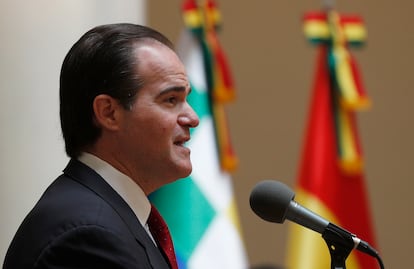Fallen IDB chief Claver Carone reports reprisals against his former aides
Workers at the regional development lender held a forum that reflects widespread concern about the organization’s situation going forward


The waters remain troubled at the Inter-American Development Bank (IDB) following the recent dismissal of its controversial president, Mauricio Claver Carone, over allegations of improper conduct with a subordinate and failure to cooperate with investigators.
Employees held a forum last week that reflected widespread concern about the IDB’s situation going forward. Many questions remain unresolved, according to records that this newspaper has had access to. In earlier interviews, current and former bank workers described a highly negative working climate at the IDB, a leading regional development institution that is owned by 48 states, although the US is the biggest shareholder with 30% of voting power.
A recurring question asked by workers at last week’s forum was what is going to happen to Claver Carone’s chief of staff and strategy – the subordinate that the president was allegedly involved with and whom he favored with hefty pay raises, as reported by an anonymous whistleblower whose revelations led to the probe.
Meanwhile, Claver-Carone has told EL PAÍS that reprisals are now being taken against individuals who collaborated with him at the bank and who defended his management. Claver-Carone, a former aide to ex-US president Donald Trump whose 2020 appointment was controversial as it broke with a tradition of choosing Latin American presidents, maintains that the accusations against him are false. In recent weeks he suggested that his dismissal was the result of a conspiracy between the Joe Biden administration, China and Latin American countries.
The employees’ questions reflect dissatisfaction by part of the staff with human resources management at the IDB, which is headquartered in Washington DC. They also point at insufficient controls and transparency, and job appointments that are not based on merit. The vast majority of the questions were anonymous, but received votes from participants, and more than 200 asked for explanations about the continuity of Claver Carone’s chief of staff, Jessica Bedoya.
Ever since the probe into Claver Carone was launched through an anonymous complaint, a “regime of terror” had been established and employees lived in fear of reprisals, several people told this newspaper.
Claver Carone, however, defends his management style. “The bank has always had a history of operating in silos, of poor results and a history of corruption, and I wanted to put an end to that,” he told EL PAÍS. “When I arrived at the bank I made it clear from the beginning that maintaining the status quo was not an option. I have a direct way of doing things, and my direct style can sometimes be viewed as aggressive because I would not keep quiet. For many years the bank had been the worst financial institution in the world, it was even exposed to subprime loans. My goal was to encourage innovation and results, and that culture of results and customer satisfaction clashes with people who have been there 20 or 30 years.”
He also defends himself against criticism that he dismissed highly experienced people and promoted others who, according to former employees, were easier to control and manipulate. “We changed people because the ministers of the countries they worked for had asked for it. Customers were not satisfied and I brought in the idea of customer satisfaction. In addition, these changes have enabled the promotion of talented women who had a glass ceiling. The people who left did so with extremely generous packages for the rest of their lives. They are not victims. No company or government would have given them what they received. I have not retaliated, I have changed people to get better results. But now there are reprisals against those who worked with me at the bank.”
Claver Carone also criticizes what he views as a procedure against him without due process. “They wanted to vilify and defame me and in the end they removed me from the bank without a cause. I did not have a relationship, nobody can say that I have breached the bank’s rules, and the resolution of my termination does not say so.” EL PAÍS has had access to this resolution, which indeed does not cite a cause for the termination. It does mention the investigation carried out by the law firm Davis Polk, but without going into its conclusions.
Tu suscripción se está usando en otro dispositivo
¿Quieres añadir otro usuario a tu suscripción?
Si continúas leyendo en este dispositivo, no se podrá leer en el otro.
FlechaTu suscripción se está usando en otro dispositivo y solo puedes acceder a EL PAÍS desde un dispositivo a la vez.
Si quieres compartir tu cuenta, cambia tu suscripción a la modalidad Premium, así podrás añadir otro usuario. Cada uno accederá con su propia cuenta de email, lo que os permitirá personalizar vuestra experiencia en EL PAÍS.
¿Tienes una suscripción de empresa? Accede aquí para contratar más cuentas.
En el caso de no saber quién está usando tu cuenta, te recomendamos cambiar tu contraseña aquí.
Si decides continuar compartiendo tu cuenta, este mensaje se mostrará en tu dispositivo y en el de la otra persona que está usando tu cuenta de forma indefinida, afectando a tu experiencia de lectura. Puedes consultar aquí los términos y condiciones de la suscripción digital.








































